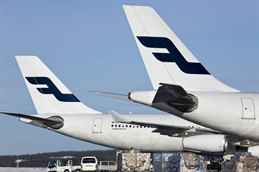
IAG Cargo is building up a network of alliance partners. The European carrier has formed ties with Finnair Cargo to utilize one another’s network.
Carriers have been interlining traffic for decades to extend their reach, but there are usually no provisions to move a partner’s traffic on a preferential basis, resulting in interline shipments languishing at transfer points waiting for an opening on the connecting flight. IAG has addressed this with its Partner Plus programme, under which an ally’s transit cargo is expected to be treated identically to the carrier’s own freight.
“We aim to treat our partners’ cargo as we would a customer’s,” said Steve Gunning, CEO of IAG Cargo.
Besides traditional interline arrangements, which operate on a standby basis, IAG now has five allies in its Partner Plus scheme. Besides Finnair Cargo, which abandoned its own longhaul freighter activities at the end of December, IAG has such an alignment with Qatar Airways, Japan Airlines, American Airlines and the Avianca group.
Interlining with space commitments is not the only fresh angle on the airline alliance scheme. Together with Qatar Airways, IAG explored a new avenue a year ago when it struck a maindeck capacity agreement with the Middle Eastern carrier. IAG has taken fixed space on Qatar’s freighter run from Hong Kong over Doha to London, a move that allowed the European carrier to scrap its wetlease deal for three B747-8 freighters and still have maindeck lift between Hong Kong and its home market. For Qatar Airways, IAG’s commitment guaranteed a certain level of cargo on the flight, reducing its own commercial risk on a sector that faces strong competition, such as scheduled lift by Cathay Pacific.
At the time when the IAG-Qatar agreement was announced, Gunning indicated that he wanted to explore further synergies with the Middle Eastern partner.
Lufthansa, which was one of the early proponents of an alliance strategy with the WOW group formed in the year 2000, is also exploring new ways to make the concept work. WOW, which involved Japan Airlines, Singapore Airlines and Scandinavian Airline System, was based on interlining cargo but failed to make headway and was quietly abandoned. Top brass of the German carrier subsequently blamed its failure chiefly on the absence of a common financial pot that would have offered an incentive to personnel of the participants to focus on cargo from their alliance partners.
According to Stan Wraight, executive director of Strategic Aviation Solutions International and a former senior executive with KLM Cargo, the Dutch airline’s transatlantic alignment with Northwest Airlines proved successful largely because of a revenue sharing agreement on the sector.
“Revenue sharing is a good way to come together, works well; however it has to be equitable and saleable in the market,” said Ram Menen, the former head of cargo of Emirates airlines.
After the demise of WOW, Lufthansa concentrated on exploiting synergies within its group, notably with Austrian Airlines and Swiss International, but this did not prevent the German carrier from pursuing a different alliance strategy. This manifested itself last summer through the joint venture with All Nippon Airways, a partnership based on joint sales activities and antitrust immunity.
According to the Japanese venture partner, the ultimate goal of the undertaking goes beyond joint pricing to the emergence of “a virtual one airline” to control both airlines capacity jointly.
For its part, Lufthansa is working on a second cargo alliance, but has not disclosed the intended partner nor what type of relationship this will take. There has been speculation about a Lufthansa-United Airlines axis, but both carriers have declined to comment on such a scenario.
Meanwhile, the cargo alliance concept is finding favour even among carriers where the top brass is sceptical about passenger alliances – even though those are well-entrenched and are widely regarded as generating more tangible benefits than a tie-up in cargo. Last September, James Hogan, CEO of Etihad Airways, described the airline alliance model as “fractured” and stated that his company would rely on acquiring equity stakes in other carriers and establishing codeshare deals instead.
The following month saw the announcement of an alliance between Etihad Cargo and Avianca Cargo to operate a twice-weekly B747 freighter run between Milan and Bogota.
By Ian Putzger
Air Freight Correspondent | Toronto



